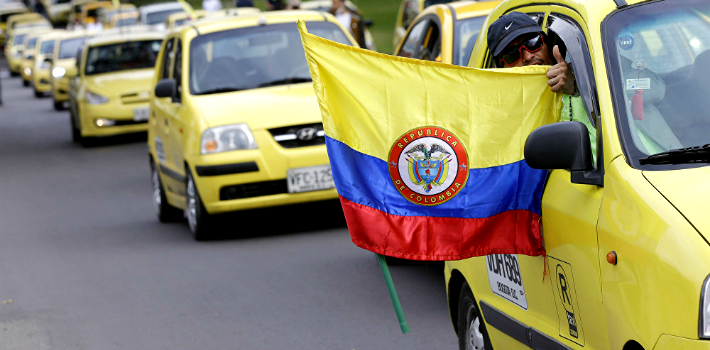
EspañolWhile taking part in the recent campaign for mayor of Bogotá as an independent candidate, I realized that new political movements are necessary, because they can defend ideas and measures which traditional party leaders can’t even mention.
In this case, for instance, neither eventual winner Enrique Peñalosa, who ran for the Conservative and Radical Change parties, nor his main rivals spoke of the disproportionate power which teachers’ unions exert over public education, both in Bogotá and in the rest of the country. Nor did they deem it necessary to speak of the tremendous corruption which taints a significant portion of the Bogotá police force.
But the last elections’ pooh-bahs were particularly reluctant to touch the thorny issue of Uber in Bogotá, and the reasons are quite obvious.
[adrotate group=”7″]
Each candidate knew very well that Uber and similar companies are popular among users, and that they offer a solution, however partial, to Bogotá’s daunting transportation problems. But they also knew that, if the teachers’ union can elect several local councilmen by itself, then the taxi drivers’ voting block, which is led by Uldarico Peña, perhaps Bogotá’s most powerful taxi owner, can “decide who becomes the next mayor,”as La Silla Vacía reported a few years ago.
So it was hardly surprising that, when the Uber question popped up in a debate in which only the top four candidates took part, none spoke in favor of the digital technology as a means to improve citizens’ lives. None mentioned the sharing economy’s immense potential to create jobs while providing 21st-century consumers with more options and better opportunities.
Peñalosa said that “there can be no unequal treatment, because taxis pay for a permit and are subject to congestion restrictions.” Rafael Pardo, who ran for the Liberal and National Unity parties and counted with the support of a large amount of cab drivers, claimed that Uber engaged in “unfair competition.” Franciso Santos, the Democratic Center’s candidate, proposed the creation of “a fairer model” for taxi drivers. Clara López, of the socialist Democratic Pole party, asserted that “the higher social strata use Uber as an absolutely illegal service.”
In the end, it was Peñalosa who got away with portraying Uber as foreign, baby-seal-crushing neanderthals, since he obtained Uldarico’s support and, in effect, won the election.
But Peñalosa isn’t the only high-ranking politician who, at least in part, owes his power to the Bogotá taxi cartel.
As I wrote last year in the PanAm Post, President Juan Manuel Santos and his then Labor Minister Rafael Pardo promised thousands of Bogotá taxi drivers that they would cancel “applications that promote illegality” — in other words, Uber — when they sought their votes prior to the second round of the 2014 presidential election.
This blatant act of demagoguery was particularly heedless. Did President Santos actually know what measures would be necessary in order to take Uber out of the Colombian market? Probably not, but the fact is that Santos decided to wash his hands of the whole Uber business and announce in the middle of the campaign that he would leave the decision to his vice president, Germán Vargas Lleras.
Was this a fired shot in the midst of the “cold war” that, according to rumors, is being waged inside the presidential palace between Santos supporters and those of Vargas Lleras? Did the president, who was supporting Pardo for mayor of Bogotá, wish to leave his second-in-command against the wall as a means to damage Peñalosa’s candidacy, which counted with Vargas Lleras’s support?
It might be, but the fact is that the vice president reacted intelligently — from the point of view of his own self-interest, that is — and announced that no decision regarding Uber would be taken until after the October 25 election.
It was only until November 12 that the vice president’s decree regarding Uber came to be known. According to the radio station W Radio, the decision in effect ends the way in which Uber has operated in Colombia thus far. The government will impose the particular conditions under which “luxury taxicabs” may operate in the future. These include specifications for the vehicles, including the color, and minimum fees determined by the state.
This submission to the bidding of Uldarico and other high-handed taxicab owners was rather predictable. After all, Germán Vargas Lleras will definitely be a presidential candidate in 2018, and he knows full well that a win in Bogotá is important in order to ensure a victory nationwide. He also knows that the taxi drivers’ votes can make the difference between winning and losing in the Colombian capital.
Once again in Colombia, consumer choice — in this case the freedom to choose a means of transport without government intervention — is denied by the cronyism that has subjugated the national economy for over a century.
 Versión Español
Versión Español












